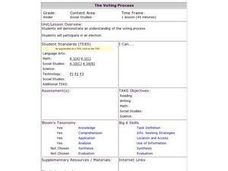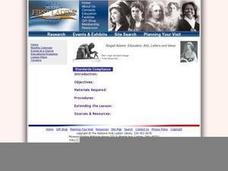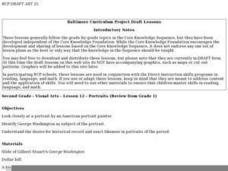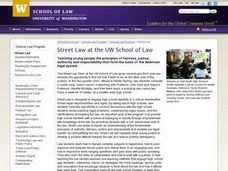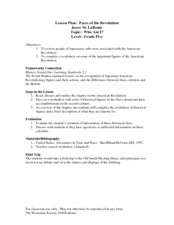Curated OER
Kids Voting USA
Ninth graders use technology to learn about the right to vote and research information on candidates. They write questions for presidential candidates. Students read online chats with different candidates for senate and presidency.
Curated OER
The Voting Process
Students discuss the subject of voting. They are introduced to the question "How do we get what we want?" Explain to students that their parents vote in elections for our leaders, such as our president, for example. Discuss what a...
Curated OER
Charging into Battle with Hood's Texas Brigade
Seventh graders study the American Civil War and the contributions of Texans to the war effort. They read first-hand accounts of Joseph Polley, member of Hood's Texas Brigade and discuss his account of his first charge and what emotions...
National First Ladies' Library
Synthesizing Music with the Technology Invention of the Modular Synthesizer
Students explore how to create synthesized music and discuss what they believe music would sound like without electronics. They explore a given website to determine how different types of instruments can be digitized. In groups, students...
Curated OER
Writing to Focus Reading and to Imagine Researching
Students examine several elements that would cue them into a newspaper article about community change without reading the main copy text. They discuss the details and write notes about the article. They first skim and then thoroughly...
Curated OER
Campaign 2004: Classroom Electorate
Young scholars role play as political analysts first forecasting the electoral college vote in a presidential election and then, following the results of the actual count. They study the role of swing states, and why political...
Curated OER
Civil Rights and the Michigan Supreme Court I: A Case of Racial Discrimination in the late 1800s and Minority Supreme Court Justices
Students read the decision of the Michigan Supreme Court in the Ferguson v. Gies, a case dealing with discrimination in a restaurant. They participate in a class discussion about the case and the justices that presided over it. They...
Curated OER
Intermediate Synonyms and Antonyms #9
In this synonyms and antonyms learning exercise, students choose the best synonym for the first 6 words and the best antonym for the next 6 words.
Curated OER
VS.6a
Sixth graders explore, discuss and explain why George Washington is called the "Father of our Country" and James Madison is called the "Father of the Constitution." They view and create a graphic organizer after discussing a variety of...
Curated OER
George Washington
First graders gain background knowledge about George Washington. They visit a website to find out additional information. Students create a web on chart paper of his important events, write a non fiction book about hima nd share their...
Curated OER
GroWing Up
Students investigate a short biography of George Washington's childhood. They examine the differences between life for students in the eighteenth century and today.
National First Ladies' Library
Jefferson's Legacy: A National Library
Students examine the creation of the Library of Congress. They investigate reasons why Thomas Jefferson sold his personal collection to the Library. Employing various research resources, students write newspaper articles about the sale...
Curated OER
Abraham Lincoln
Students discuss key events of Abraham Lincoln's life. In this Civil War lesson, students discuss the major events of Abraham Lincoln's life and role during this time through a song.
Curated OER
Founding Documents of the Peace Corps
Students examine United States foreign policy in the period immediately following World War II through the activities of the Peace Corps.
Curated OER
VS.6b
Sixth graders explore, analyze and identify the ideas of George Mason and Thomas Jefferson as expressed in the Virginia Declaration of Rights and the Virginia Statue for Religious Freedom. They list and declare the responses stated in...
National First Ladies' Library
Government: Defending the Bill of Rights
Pupils examine the proposition of a country without the Bill of Rights. In a role-playing activity, teams of students gather information to build a case for retaining the Bill of Rights and present it before their congressperson.
Curated OER
Visual Arts: Portraits
Second graders examine a portrait of George Washington, and analyze the historical record and likeness in portraits of the period. They create their own portraits from snapshots brought to school.
Curated OER
Racists Actions Toward the Native Americans
Young scholars explore Thomas Jefferson and his attitude toward Native Americans. They study maps from European colonization and the westward movement that pushed the Native Americans further west. Students analyze primary source...
Curated OER
Street Law: Paternity in Washington
Students are introduced to the topic of paternity under street law enforcements. As a class, they discover the many stakeholders when asking about paternity under Washington law. They examine how the court has the best interest of the...
Curated OER
Faces of the Revolution
Fifth graders investigate the important figures of the American Revolution. In this American Revolution activity, 5th graders outline the important events of the war and complete a worksheet.
State Library of Ohio
Tuck Everlasting
A great toolbox of ideas for any teacher preparing to teach the novel Tuck Everlasting by Natalie Babbitt, this resource includes a short biography of Natalie Babbitt, several discussion questions that could double as writing prompts,...
Curated OER
Fact and Opinion
Facts and opinions are clearly defined in this organized PowerPoint. Following the definitions are a few examples that students must identify as facts or opinions. Tip: After viewing this presentation, ask students to share some of their...
Facing History and Ourselves
Choosing to Participate Posters
"A poster exhibit to encourage dialogue, engagement, respect, and participation in our communities..." This is a set of attractive posters that reference influential historical figures, such as George Washington and Albert Einstein, and...
E Reading Worksheets
Fact and Opinion - Worksheet: 1
Pupils identify fact and opinion statements with a language arts worksheet. Then, they explain their thinking in a sentence, including the clues or set of words that helped them arrive at their answer.



